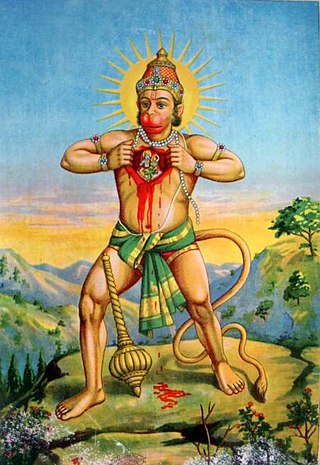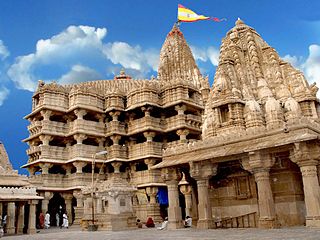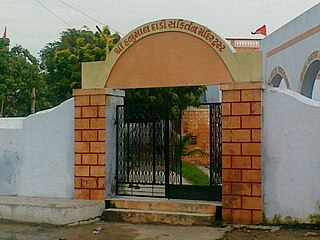
Parashurama, also referred to as Rama Jamadagnya, Rama Bhargava and Virarama, is the sixth avatar among the Dashavatara of the preserver god Vishnu in Hinduism. He is believed to be one of the Chiranjivis (Immortals), who will appear at the end of the Kali Yuga to be the guru of Vishnu's tenth and last incarnation, Kalki.

The Ramayana, also known as Valmiki Ramayana, as traditionally attributed to Valmiki, is a smriti text from ancient India, one of the two important epics of Hinduism known as the Itihasas, the other being the Mahabharata. The epic narrates the life of Rama, a prince of Ayodhya in the kingdom of Kosala. The epic follows his fourteen-year exile to the forest urged by his father King Dasharatha, on the request of Rama's stepmother Kaikeyi; his travels across forests in the Indian subcontinent with his wife Sita and brother Lakshmana; the kidnapping of Sita by Ravana, the king of Lanka, that resulted in war; and Rama's eventual return to Ayodhya along with Sita to be crowned king amidst jubilation and celebration.

Hanuman, also known as Maruti, Bajrangabali, and Anjaneya, is a deity in Hinduism, revered as a divine vanara, and a devoted companion of the deity Rama. Central to the Ramayana, Hanuman is celebrated for his unwavering devotion to Rama and is considered a chiranjivi. He is traditionally believed to be the spiritual offspring of the wind deity Vayu, who is said to have played a significant role in his birth. In Shaiva tradition, he is regarded to be an incarnation of Shiva, while in most of the Vaishnava traditions he is the son and incarnation of Vayu. His tales are recounted not only in the Ramayana but also in the Mahabharata and various Puranas.

Lakshmana, also known as Laxmana, Saumitra and Ramanuja, is a Hindu god and the younger brother of Rama in the Hindu epic Ramayana. Lakshmana is considered as an incarnation of Shesha, the lord of the serpents and is the husband of Urmila, an avatāra of Nagalakshmi. Lakshmana is known for his loyalty and dedication towards his elder brother, Rama.

Shatrughna is a prince of Ayodhya, King of Madhupura and Vidisha, and a brother of Prince Rama in the Hindu epic Ramayana. He is also known as Ripudaman. He is the twin of Lakshmana. He is a loyalist of Bharata, just like Lakshmana is to Rama. According to the Valmiki Ramayana, Shatrughna is an incarnation of the Sudarshana Chakra. Shatrughna also appears as the 412th name of Vishnu in the Vishnu Sahasranama of the Mahabharata.

In Hinduism, Vanara are either monkeys, apes, or a race of forest-dwelling people.

Dwarka is a town and municipality of Devbhumi Dwarka district in the state of Gujarat. It is located on the western shore of the Okhamandal Peninsula on the right bank of the Gomti river at the mouth of the Gulf of Kutch facing the Arabian Sea.

Panchamukha, also rendered Panchamukhi, is a concept in Hindu iconography, in which a deity is represented with five heads. Several Hindu deities are depicted with five faces in their iconography, such as Hanuman, Shiva, Brahma, Ganesha, and Gayatri.

Bharata is a figure in the ancient Hindu epic Ramayana. He is the son of Dasharatha, the king of Kosala, and Kaikeyi, the daughter of King Ashvapati of Kekeya. He is a younger half-brother of Rama. He rules Ayodhya as its regent while Rama is banished from his kingdom, and fights to rescue his wife Sita, kidnapped by Ravana.

In some versions of the Ramayana such as the Krittivasi Ramayana, Mahiravana, also called Ahiravana, is a rakshasa ruler of Patala. He is variously described as either an ally or a brother of the rakshasa king Ravana. He secretly carried away Rama and his brother Lakshmana to the nether-world, consulted his friends, and decided to sacrifice the life of the two divine brothers at the altar of his chosen deity, goddess Mahamaya. However, Hanuman saved their lives by decapitating Mahiravana, and destroying his army.

Okha is a coastal town in Devbhoomi Dwarka district of Gujarat state in India. It has a sea port. Dwarka situated some 30 km south and Bet Dwarka island situated 2.9 km across a small creek from Okha port are a major Hindu pilgrimage sites due to a temple dedicated to Krishna.
Patvi Namdar Maharajkumar Shri Udaybhansinhji Natwarsinhji Jethwa Sahib, was the last Maharajkumar or Yuvraj of Jethwa dynasty of Princely State of Porbandar. He was associated with cooperative movement in post-independent India and was recipient of Padma Shri.

Bet Dwarka or Shankhodhar is an inhabited island at the mouth of the Gulf of Kutch, situated 2 km (1 mi) off the coast of the town of Okha, Gujarat, India, and 25 km (16 mi) north of the city of Dwarka. Northeast to southwest, the island measures 8 km (5 mi) long and averaging 2 km (1 mi) wide. The island's name "Shankhodhar" derives from the fact that the island is a large source of conch shells.
Jaabaali Maharshi was a Hindu saint and philosopher. There are many saints and philosophers with the same name in Puranas.
Jai Hanuman is a 1997 Indian television series based on the life of the Hindu deity Hanuman, an avatar of Shiva, in Hindi. It was directed by Sanjay Khan. The series was initially shown on the state-run DD National, and was later shown on Sony Entertainment Television in 2008.

Macchanu, is son of Hanuman that appears in the Thai and other versions of the Ramayana.

Ganadhal is a village near Gillesugur village in the Raichur taluk of Raichur district in the Indian state of Karnataka. Ganadhal is famous for the Sri Panchamukhi Hanuman Temple where Sri Raghavendra Swamiji did penance for 12 years. Ganadhal can be reached from Raichur and Mantralayam.
Jethwa dynasty was a dynasty that ruled over present day Gujarat region of India from 7th century AD till middle of 20th century, when India became independent. It was a Rajput dynasty ruled by Jethwa clan of Rajputs.

The Hanuman Dandi Temple is a Hindu temple located on Beyt Dwarka, an island off the coast of Gujarat, India, dedicated to the deity Hanuman and his son Makardhwaj. Situated approximately 5 kilometers from the Dwarkadhish Temple in Bet Dwarka, this temple is unique as it features idols of Hanuman and Makardhwaj, showcasing a rare depiction of Hanuman, who is traditionally considered a celibate, with his progeny.















